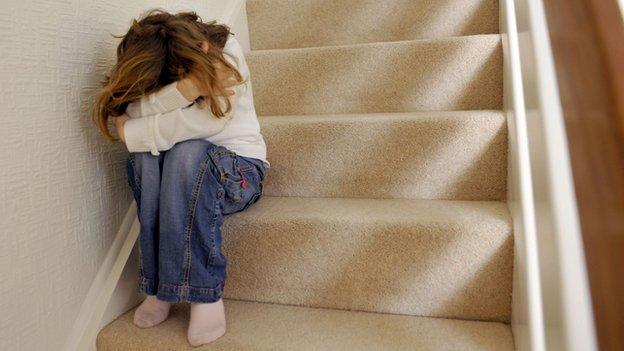Councils 'ring round' for child sex abuse care places
- Published

Many children had experienced multiple placement moves which are unsettling
Local authorities in England are having to "phone around" to find secure placements for girls at risk of child sexual exploitation, a report says.
Despite recent high-profile sex abuse scandals, such as Rotherham, there is a shortage of appropriate placements, the National Audit Office says.
Overall, it found many children had multiple placement moves while in care.
The government says the report ignores the progress it has made in improving the life chances of children in care.
The NAO report - entitled Children in Care - says: "Local authorities told us that a particular pressure is emerging for secure residential places for girls at risk of child sexual exploitation.
'Multiple placements'
"There is no central clearing point for this capacity so local authorities simply have to telephone around England, or even Scotland, to find a free place, if one exists.
"A report by Ofsted on this issue found that the commissioning of placements for children at risk of, or subject to, child sexual exploitation were undertaken in all local authorities through spot purchasing arrangements.
"It also found that children had experienced multiple placement moves and risks remained unaddressed due to poor placement planning and poor commissioning of an initial placement that was failing to meet the needs of the young person."
Overall, the report said there has been no improvement since 2009 in getting children into the right placement first time and close to home.
"The Department has an objective to improve placement stability and measures the number of placements a child has in a year and whether they are placed within 20 miles of home.
"At the end of March 2013, 34% of children in care had more than one placement during the year, the same proportion since 2009 and 14% of foster children and 34% of those in residential care were placed more than 20 miles from home.
"The overall numbers have not improved in the last four years."
'Fundamentally flawed'
It went on to say more than one in 10 children in care were moved three more times during a single year.
This issue is important because numerous placements "unsettle the child" and often lead to "poorer outcomes" for the child such as mental health issues and emotional instability, as well as greater expense for the local authority, the report said.
The Department for Education, which has responsibility for the care system, says the figures are skewed and do not take into account the fact that many children who go into care are put into short-term emergency placements which are quickly followed by longer term ones.
Children's Minister Edward Timpson said: "This is a fundamentally flawed and misleading analysis of the government's work to improve the lives of some of our most vulnerable children.
"I will always be the first to say that more needs to be done but this report ignores the very real progress that has been made in transforming the life chances of children in care.
"It is a fact that since 2010, children in care are doing better at school and absences from school have decreased.
"Foster children can also now stay at home until the age of 21, and this year a record number of children found places in stable, loving homes through adoption."
'Emotional well-being'
But the report also stressed that the DfE had no means of measuring the efficacy of the care system even though its objective was to improve the quality of care on offer to children.
Enver Solomon, director of evidence and impact for the National Children's Bureau, said "there are still significant numbers of children who have a poor care experience, often moving around the care system without consistent support."
"It is vital that placements and packages of care are always secured on the basis of the needs and preferences of the child and not simply the cost of providing care. There also needs to be a much greater focus on promoting a child's emotional wellbeing and resilience."
"We welcome the fact the government has sought to tackle issues such as the stability of placements, the quality of residential care, and support for care leavers.
"But there is plenty of room for further improvement. Central and local government must ensure that those planning services have the evidence, knowledge and capacity to meet the needs of every child in care, and are subject to effective oversight ."
Anne Longfield, chief executive of children's charity 4Children said: "The NAO suggests high profile cases around child sexual exploitation, such as Rotherham, will lead to a further rise in the number of children in care.
"4Children repeats it call for a new high level, stand-alone inquiry led by the Prime Minister which looks explicitly at the extent of child sexual exploitation in the UK today and what can be done to prevent it.
- Published18 November 2014

- Published19 November 2014
